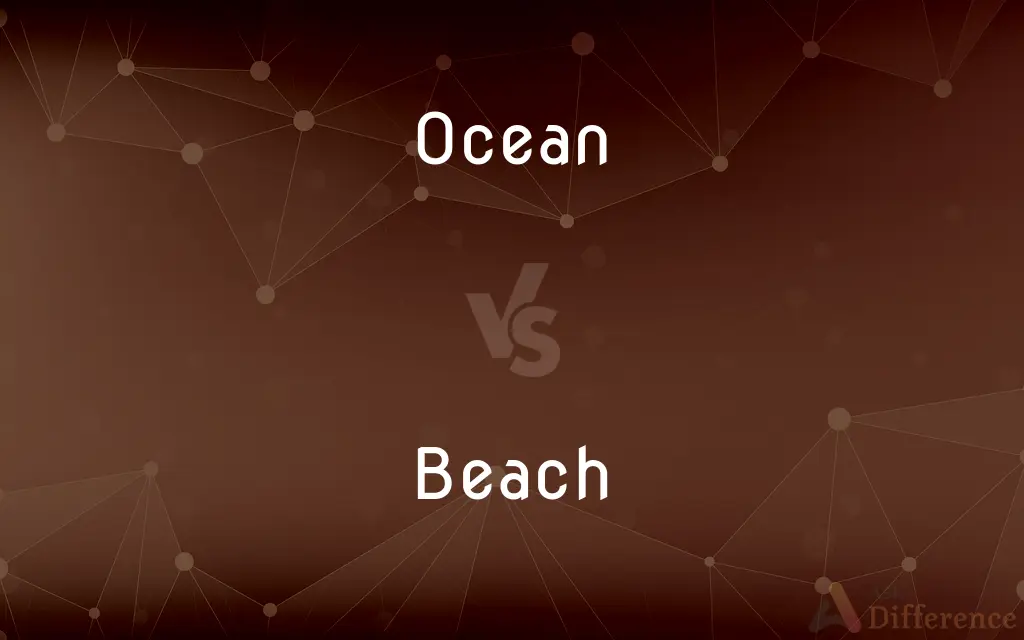Ocean vs. Beach — What's the Difference?
By Tayyaba Rehman — Updated on September 28, 2023
An ocean is a vast body of saltwater that covers about 71% of Earth's surface. A beach is the shoreline area where sand, pebbles, or gravel meet the edge of the ocean or another body of water.

Difference Between Ocean and Beach
Table of Contents
ADVERTISEMENT
Key Differences
An ocean represents one of the five vast bodies of saltwater on our planet. These include the Pacific, Atlantic, Indian, Arctic, and Southern Oceans. On the contrary, a beach characterizes the boundary region where land encounters the ocean or another body of water.
While the ocean plays a critical role in regulating Earth's climate and weather patterns, a beach is often associated with relaxation, vacations, and leisure activities. Both the ocean and beach together provide a natural habitat for various marine life, with the beach often acting as nesting sites for creatures like turtles.
The vastness of an ocean can span thousands of miles and reaches depths of over 36,000 feet, as seen in the Mariana Trench in the Pacific Ocean. A beach, however, has a more limited scope, stretching along the coasts and often seen as a narrow strip or extended area of sand or pebbles.
Oceans hold nearly 97% of the planet's water, making them indispensable for life on Earth. Beaches, while just a fraction of the size of oceans, serve as popular tourist destinations, buffer zones during storms, and areas of significant ecological importance.
Comparison Chart
Definition
Vast body of saltwater.
Land area meeting a body of water.
ADVERTISEMENT
Role
Regulates climate and weather.
Recreation and ecological importance.
Size and depth
Spans thousands of miles; very deep.
Typically a narrow or extended strip.
Examples
Atlantic, Pacific, Arctic, etc.
Miami Beach, Waikiki, Bondi Beach, etc.
Associated Life
Various marine life.
Coastal life, nesting sites for turtles.
Compare with Definitions
Ocean
A significant source of resources including fish and minerals.
The ocean provides a vast array of seafood that many people rely on for sustenance.
Beach
A natural habitat for various coastal life forms.
Every year, this beach becomes a nesting site for endangered turtles.
Ocean
A vast expanse of saltwater covering the Earth's surface.
The Pacific Ocean is the largest and deepest of the world's oceans.
Beach
The land area that meets the edge of a sea, lake, or river.
We spent the day relaxing on the beach and building sandcastles.
Ocean
An inspiration for numerous tales, myths, and explorations.
Many sailors have been lured by the mysteries of the open ocean.
Beach
A boundary acting as a buffer during high tides and storms.
The beach's dunes offer a natural barrier against coastal erosion.
Ocean
One of the major divisions of the world's saltwater bodies.
The Arctic Ocean is the smallest and shallowest of the five oceans.
Beach
The shoreline segment often made up of sand, pebbles, or gravel.
The beach had soft white sand that felt amazing underfoot.
Ocean
A body of water playing a crucial role in climate regulation.
The warming of the ocean contributes to global climate change.
Beach
A beach is a landform alongside a body of water which consists of loose particles. The particles composing a beach are typically made from rock, such as sand, gravel, shingle, pebbles, etc., or biological sources, such as mollusc shells or coralline algae.
Ocean
The ocean (also the sea or the world ocean) is the body of salt water which covers approximately 71% of the surface of the Earth and contains 97% of Earth's water. Another definition is "any of the large bodies of water into which the great ocean is divided".
Beach
A pebbly or sandy shore, especially by the sea between high- and low-water marks
Fabulous sandy beaches
Ocean
The entire body of salt water that covers more than 70 percent of the earth's surface.
Beach
Run or haul up (a boat or ship) on to a beach
At the water's edge a rowing boat was beached
Ocean
Abbr. Oc. or O. Any of the principal divisions of the ocean, including the Atlantic, Pacific, Indian, Arctic, and Southern Oceans.
Beach
The shore of a body of water, especially when sandy or pebbly.
Ocean
A great expanse or amount
"that ocean of land which is Russia" (Henry A. Kissinger).
Beach
The sand or pebbles on a shore.
Ocean
(countable) One of the large bodies of water separating the continents.
Beach
The zone above the water line at a shore of a body of water, marked by an accumulation of sand, stone, or gravel that has been deposited by the tide or waves.
Ocean
(uncountable) Water belonging to an ocean.
The island is surrounded by ocean
Beach
To run, haul, or bring ashore
Beached the rowboat in front of the cabin.
Hooked a big bluefish but was unable to beach it.
Ocean
(figuratively) An immense expanse; any vast space or quantity without apparent limits.
The boundless ocean of eternity
An ocean of difference
Beach
To cause (a whale or other sea animal) to be unable to swim free from a beach.
Ocean
A blue colour, like that of the ocean (also called ocean blue).
Beach
To run or be hauled ashore
We beached near the palm trees.
Ocean
The whole body of salt water which covers more than three fifths of the surface of the globe; - called also the sea, or great sea.
Like the odor of brine from the oceanComes the thought of other years.
Beach
To be stranded on a beach. Used of sea animals.
Ocean
One of the large bodies of water into which the great ocean is regarded as divided, as the Atlantic, Pacific, Indian, Arctic and Antarctic oceans.
Beach
The shore of a body of water, especially when sandy or pebbly.
Ocean
An immense expanse; any vast space or quantity without apparent limits; as, the boundless ocean of eternity; an ocean of affairs.
You're gonna need an oceanOf calamine lotion.
Beach
A horizontal strip of land, usually sandy, adjoining water.
Ocean
Of or pertaining to the main or great sea; as, the ocean waves; an ocean stream.
Beach
The loose pebbles of the seashore, especially worn by waves; shingle.
Ocean
A large body of water constituting a principal part of the hydrosphere
Beach
Synonym of gravel trap
Ocean
Anything apparently limitless in quantity or volume
Beach
(sports) A dry, dusty pitch or situation, as though playing on sand.
Beach
(intransitive) To run aground on a beach.
Beach
(transitive) To run (something) aground on a beach.
Beach
(of a vehicle) To run into an obstacle or rough or soft ground, so that the floor of the vehicle rests on the ground and the wheels cannot gain traction.
Beach
Pebbles, collectively; shingle.
Beach
The shore of the sea, or of a lake, which is washed by the waves; especially, a sandy or pebbly shore; the strand.
Beach
To run or drive (as a vessel or a boat) upon a beach; to strand; as, to beach a ship.
Beach
An area of sand sloping down to the water of a sea or lake
Beach
Land on a beach;
The ship beached near the port
Beach
A place frequented for relaxation, sunbathing, and water activities.
The beach was crowded with tourists enjoying the summer sun.
Common Curiosities
Are all beaches located by oceans?
No, beaches can also be found along lakes, rivers, and other water bodies.
What is the primary difference between an ocean and a beach?
An ocean is a vast body of saltwater, while a beach is where land meets the water's edge.
Which is larger: a sea or an ocean?
An ocean is larger than a sea.
How deep can oceans get?
The deepest point is the Mariana Trench in the Pacific Ocean, over 36,000 feet deep.
Are there specific plants that grow only on beaches?
Yes, certain plants like seagrasses and coastal dune vegetation are adapted to beach environments.
Why are some beaches sandy and others rocky?
Beach composition depends on local geology, wave action, and other environmental factors.
What role do oceans play in the Earth's climate?
Oceans absorb carbon dioxide, regulate temperatures, and drive weather patterns.
Can oceans be freshwater?
No, oceans are saltwater bodies.
How many oceans are there on Earth?
There are five recognized oceans: Pacific, Atlantic, Indian, Arctic, and Southern.
Why is the ocean salty?
Salt in the ocean comes from rocks on land and underwater volcanic activity.
Do beaches help protect coastlines?
Yes, beaches act as buffer zones, reducing the impact of waves and preventing erosion.
What's the "ocean floor" and "beachfront"?
The ocean floor is the bottom of the ocean. Beachfront refers to property or land directly facing the beach.
Is the ocean's water level rising?
Yes, due to melting polar ice and thermal expansion, ocean levels are rising.
Can a beach be artificially created?
Yes, there are man-made beaches, created using sand or other materials.
Can beaches disappear?
Yes, through erosion, rising sea levels, and human interference, beaches can diminish or disappear.
Share Your Discovery

Previous Comparison
Expert vs. Professional
Next Comparison
Multivibrator vs. OscillatorAuthor Spotlight
Written by
Tayyaba RehmanTayyaba Rehman is a distinguished writer, currently serving as a primary contributor to askdifference.com. As a researcher in semantics and etymology, Tayyaba's passion for the complexity of languages and their distinctions has found a perfect home on the platform. Tayyaba delves into the intricacies of language, distinguishing between commonly confused words and phrases, thereby providing clarity for readers worldwide.
















































